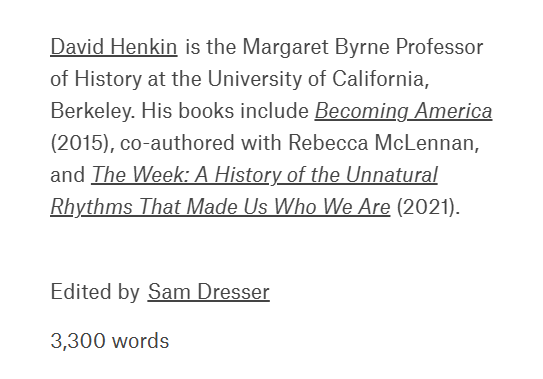How we became weekly
 The week is the most artificial and recent of our time counts yet it’s impossible to imagine our shared lives without it
https://aeon.co/essays/how-we-came-to-depend-on-the-week-despite-its-artificiality
The week is the most artificial and recent of our time counts yet it’s impossible to imagine our shared lives without it
https://aeon.co/essays/how-we-came-to-depend-on-the-week-despite-its-artificiality


Among many collective discoveries during the pandemic confinement of 2020, Americans learned just how attached we are to our seven weekdays. As complaints about temporal disorientation mounted that April, we focused not on the clock – the classic metonym for the power and experience of time – but rather on the calendar, and specifically the weekly one. A Cleveland news station affiliated with the Fox Media network entertained viewers with a daily feature, much circulated on the internet, entitled ‘What Day Is It? With Todd Meany’ – the answer to which was always a weekday, not a Gregorian calendar date.
Hours, months, seasons and other time units may have been blurred as well, but the indeterminacy of the weekly cycle dominated the discourse. From Tom Hanks’s observation in a
Saturday Night Live monologue that ‘there’s no such thing as Saturdays anymore. It’s just … every day is today’, to the ubiquitous memes that called all days ‘blursday’ or renamed the weekly cycle as ‘thisday, thatday, otherday, someday, yesterday, today and nextday’, the collapse of the week quickly became a comic cliché.
Our COVID-19 blursday experience thus brought the mysteries of weekly life to the surface of public consciousness, prompting the question of why it is that sheltering in place causes masses of people to lose track of their weekdays. Commentators generally cited the fact that, during the pandemic, many of us worked at home, which eliminated crucial environmental cues dividing work from the rest of life. Work days and leisure days started to resemble one another and, during the intermediate days of the cycle, we lost track of how close or far we were from the week’s end.
But that explanation seems inadequate. Telecommuting, after all, had become common long before the pandemic, without producing such a broad sense of temporal disorientation. Moreover, working from home unsettles time divisions
within the day even more dramatically than it unsettles the weekly cycle, yet the jokes and memes didn’t highlight our confusion about what hour it was. Nor did complaints about temporal disorientation pay equal attention to Gregorian date confusion, despite the fact that many of the pandemic’s most brutal attacks on our ritual lives – forgone Christmas dinners, suspended baseball seasons,
Zoom birthday parties – disrupted the annual calendar rather than the weekly one. And finally, uncertainty about the weekly cycle was not limited to the question of weekends but extended throughout the seven-day cycle.
snip
 = new reply since forum marked as read
= new reply since forum marked as read



